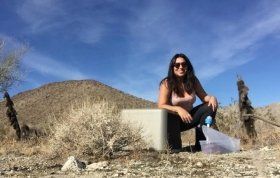Two viruses closely related to Zika – West Nile and Powassan – can spread from an infected pregnant mouse to her fetuses, causing brain damage and fetal death, according to a new study from Washington University School of Medicine in St. Louis. The findings suggest that Zika may not be unique in its ability to cause miscarriages and birth defects.
articles
Cancer 'Vaccine' Eliminates Tumors in Mice
Injecting minute amounts of two immune-stimulating agents directly into solid tumors in mice can eliminate all traces of cancer in the animals, including distant, untreated metastases, according to a study by researchers at the Stanford University School of Medicine.
NASA's GPM Probes Category 4 Tropical Cyclone Cebile
NASA analyzed a major tropical cyclone spinning in the Southwestern Indian Ocean and measured its rainfall.
Smog-Forming Soils
A previously unrecognized source of nitrogen oxide is contributing up to about 40 percent of the NOx emissions in California, according to a study led by the University of California, Davis. The study traces the emissions to fertilized soils in the Central Valley region.
Mammals Move Less in Human-Modified Landscapes
Most mammals are on the move every day searching for food, finding a mate or seeking shelter. But mammals in human-modified landscapes move much shorter distances on average than in more natural areas – a finding that could have far-reaching consequences for ecosystems and society, according to a new international study co-authored by University of Guelph biologists.
Prof. John Fryxell, chair of U of G’s Department of Integrative Biology, and post-doctoral researcher Tal Avgar helped lead a global research project whose findings were published recently in Science.
UW-Led Climate Study: Most of Last 11,000 Years Cooler Than Past Decade in North America, Europe
University of Wyoming researchers led a climate study that determined recent temperatures across Europe and North America appear to have few, if any, precedent in the past 11,000 years.










